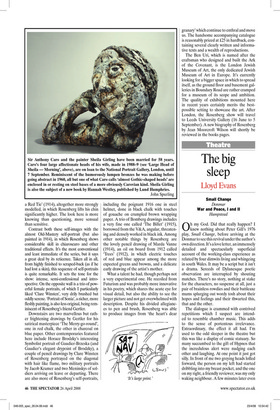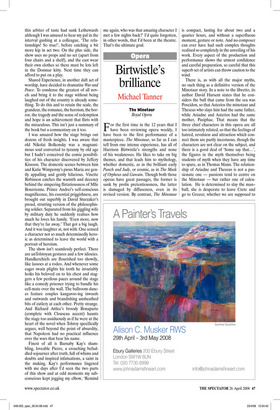The big sleep
Lloyd Evans
Small Change Donmar War and Peace, I and II Hampstead
Oh my God. Did that really happen? I knew nothing about Peter Gill’s 1976 play, Small Change, before arriving at the Donmar to see this revival under the author’s own direction. It’s a love letter, an immensely detailed and spectacularly superficial account of the working-class experience as related by four dimwits living and whingeing in south Wales. It may be a script but it isn’t a drama. Screeds of Dylanesque poetic observation are interrupted by shouting matches. There’s no story, nothing at stake for the characters, no suspense at all, just a pair of brainless rowdies and their battleaxe mums splurging out wordy tosh about their hopes and feelings and their thwarted this, that and the other.
The dialogue is crammed with contrived repetitions which I suspect are intended to resemble chamber music. This adds to the sense of portentous irrelevance. Extraordinary, the effect it all had. I’m used to the odd sleeper in the theatre but this was like a display of comic statuary. So many succumbed to the gift of Hypnos that the incredulous alert were nudging each other and laughing. At one point it just got silly. In front of me two greying heads lolled forward, the person on my left had started dribbling into my breast pocket, and the one on my right, a friendly reviewer, was my only waking neighbour. A few minutes later even this arbiter of taste had sunk Lethewards although I was amused to hear my pal in the interval gushing at a colleague, ‘The relationships! So true!’, before catching a bit more kip in act two. On the plus side, the show uses no props and no set (apart from four chairs and a shelf), and the cast wear their own clothes so there must be lots left in the Donmar kitty. Next time they can afford to put on a play.
Shared Experience, in another daft act of worship, have decided to dramatise War and Peace. To condense the greatest of all novels and bring it to the stage without being laughed out of the country is already something. To do this and to retain the scale, the grandeur, the romance, the heroism, the horror, the tragedy and the sense of redemption and hope is an achievement that flirts with the miraculous. This isn’t just a summary of the book but a commentary on it too.
I was amazed how the stage brings out dozens of fresh insights. I was aware that old Nikolai Bolkonsky was a magnanimous soul converted to tyranny by old age but I hadn’t conceived the comic possibilities of his character discovered by Jeffery Kissoon. The domestic scenes between him and Katie Wimpenny’s pious Maria are gently appalling and gently hilarious. Vinette Robinson catches the warmth and decency behind the simpering flirtatiousness of Mlle Bourrienne. Prince Andrei’s self-conscious magnificence, his essential priggishness, are brought out superbly in David Sturzaker’s proud, strutting version of the philosophising soldier. Separated from his giggling wife by military duty he suddenly realises how much he loves his family. ‘Even more, now that they’re far away.’ That got a big laugh. And it was laughter at, not with. One sensed a character not so much determinedly heroic as determined to leave the world with a portrait of heroism.
The show isn’t seamlessly perfect. There are unTolstoyan gestures and a few idiocies. Handkerchiefs are flourished too showily, like lassoes at a rodeo. And whenever some eager swain plights his troth he invariably hoiks his beloved on to his chest and staggers a few perilous paces around the stage like a comedy prisoner trying to bundle his cell-mate over the wall. The ballroom dances feature couples kangaroo-ing inwards and outwards and brandishing unsheathed bits of cutlery at each other. Pretty strange. And Richard Attlee’s broody Bonaparte (complete with Clouseau accent) haunts the stage too assiduously as if he were at the heart of the novel when Tolstoy specifically argues, well beyond the point of absurdity, that Napoleon had no practical influence over the wars that bear his name.
Finest of all is Barnaby Kay’s shambling, loveable Pierre, a crouching befuddled sojourner after truth, full of whims and doubts and inspired infatuations, a saint in the making. Kay’s performance lingered with me days after I’d seen the two parts of this show and at odd moments my subconscious kept jogging my elbow, ‘Remind me again, who was that amazing character I met a few nights back?’ I’d quite forgotten, in other words, that I’d been at the theatre. That’s the ultimate goal.











































































 Previous page
Previous page